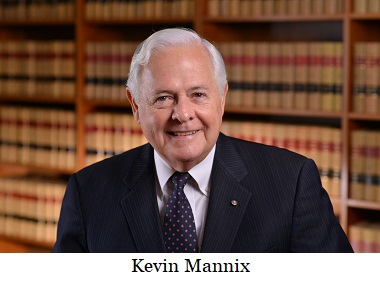What does Measure 11 do?
Editor's note: This is the first of a multi-part series on Measure 11 and its impact on crime. This series is adapted from letters written to the legislature by Kevin Mannix, the author of Measure 11.
Up to 1989, Oregon law appeared to give judges wide sentencing discretion for felonies.
Felonies were divided into three classes, separate from murder. Judges could impose up to the following maximum sentences: 20 years for Class A felonies, 10 years for Class B felonies, and 5 years for Class C felonies. However, the discretion of judges was actually significantly limited because a parole board appointed by the governor could reduce sentences and release convicted felons early. It routinely did so. This was "reformed" by the adoption of felony sentencing guidelines in 1989.
In 1989, Oregon was confronted with a shortage of prison beds and a lack of "truth-in sentencing" because the parole board had broad authority to reduce sentences imposed by judges, and often did so. A comprehensive reform package was passed by the Legislature to establish a felony sentencing guideline system. Judges were constrained from imposing felony sentences outside the guidelines. They could only go outside the guidelines for "substantial and compelling reasons."
At the same time, sentences imposed by judges could only be reduced by up to 20 percent for good behavior in prison. Accordingly, the parole board power was restricted for sentences imposed under the new system.
The problem with the sentencing guidelines is that they were written to reflect Oregon's limited prison facilities, not a determination as to the appropriate sentence from the perspective of justice. The felony sentencing guidelines were resource-driven rather than justice-driven. Proponents of the guidelines promised that additional prison facilities would be established, and the guidelines could be strengthened as the facilities came online.
Between 1989 and 1994, no legislation was passed to provide additional prison resources or to enhance the sentencing guidelines. This led me to author Measure 11, which passed by a 66% favorable vote, in November 1994. Measure 11 established mandatory minimum prison sentences for the 16 most violent crimes.
A D V E R T I S E M E N T

A D V E R T I S E M E N T
Oregon voters placed Measure 11 on the ballot on November 1994 and it passed with a 66% favorable vote. Measure 11 went into effect in April 1995.
Measure 11 establishes mandatory minimum terms of imprisonment for criminals who have been convicted of 16 specific violent and sexual crimes. Measure 11 does not involve sentences for property crimes or drug crimes. Measure 11 only addresses the worst levels of violent and sexual crimes. For example, there are four levels of criminal assault and Measure 11 only applies to Assault in the First Degree and Assault in the Second Degree; there are three levels of robbery, but Measure 11 only applies to Robbery in the First Degree and Robbery in the Second Degree.
There are 16 crimes - out of the scores if not hundreds of crimes defined in Oregon statutes - which are covered by voter-passed Measure 11:
- Murder
- First Degree Manslaughter
- Second Degree Manslaughter
- First Degree Assault
- Second Degree Assault
- First Degree Kidnapping
- Second Degree Kidnapping
- First Degree Rape
- Second Degree Rape
- First Degree Sodomy
- Second Degree Sodomy
- First Degree Unlawful Sexual Penetration
- Second Degree Unlawful Sexual Penetration
- First Degree Sexual Abuse
- First Degree Robbery
- Second Degree Robbery
--Staff Reports| Post Date: 2021-03-21 09:37:23 | Last Update: 2021-03-21 09:45:46 |







